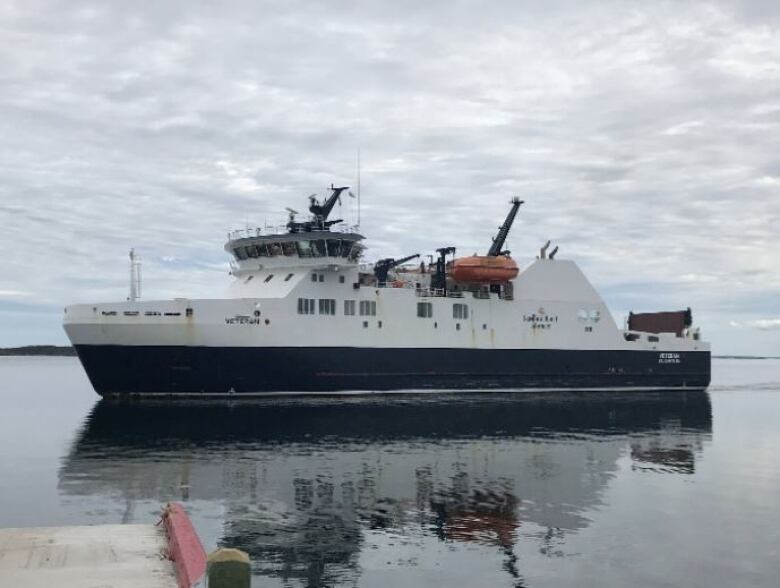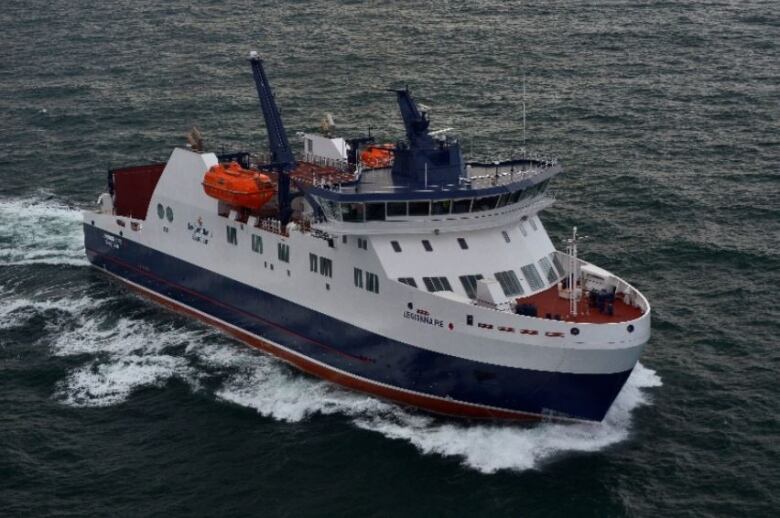N.L. government fumbled purchase of 2 ferries, according to new AG report
Problems include a lack of oversight during construction of MV Veteran and MV Legionnaire

A scathingauditor general report released earlier this week found the provincial government mismanaged its project to obtain two new provincial ferries in 2013.
The report, released Wednesday,raised a number of concerns related to the Department of Transportation's management of procuringthe MV Veteran and MV Legionnaire ferries, which included problems witha lack oftraining, oversight during sea trials, concerns during theconstructionphasesandfirst days of service.
The Veteran and the Legionnaire serve Fogo Island and Bell Island, respectively.
The report found the department's mismanagement may have led to "significant operational delays, service disruptions and substantial unplanned costs during the construction, operationalization and initial operations of the vessels."
The total cost of both ferries was about $120 million, which includedwharf upgrades in Newfoundland. Intheir first three years in service the two vessels spent 607 days out of servicecombined.Equipment failures and vessel damages also resulted in unplanned costs of about $4.2 million.
"Some of that was covered by insurance,"Auditor General Denise Hanrahan told CBC News on Friday.
"Our evidence showed that there were various issues encountered with operating the vessels to the point where they found there was human error."
The audit began in March 2018 whenthe public accounts committee asked the auditor generalto review the process used to purchase the two vessels and the mechanical issues experienced since they began service.

"Residents of the province rely on the daily services of government-owned and/or private vessels," the report reads.
"Given the need to replace aging vessels, it is essential that the Department of Transportation and Infrastructure have effective project management processes in place to ensure the successful construction and operationalization of new vessels."
Construction concerns
Hanrahansaid the biggest concern her officefound was with project management.
The report found the Department of Transportation had no established project management process to guide the construction of the ferries, which were built in a shipyard inGalati, Romania. It also found the departmentdid not follow expected project management planning processes and had inadequate information and document management processes.
"These are really sophisticated vessels, a significant investment of public money of $120 million, and it's really important to have robust project management processes, to manage from start to finish including when they go in operation," she said.
The report also says the department could not show due diligence on economic development commitments and there were a list of problems during the constructionphases.
The problems included inadequate construction oversightat the shipyard, mismanaged onsite roles during construction and operations, a lack of representation during inspections or acceptance testing andno final performance runs completed upon arrival in the province.

"Multiple documents indicated the need for an onsite presence during the whole of the vessels' construction. Overall, we found that there was no onsite representation (either department officials or the hired onsite supervisor) present for 67 per cent of the days the MV Veteran was under construction, and 63 per cent of the days for the MV Legionnaire," the report reads.
"As a result of the department not having sufficient representation during the construction of the vessels, certain elements of the construction may not have been observed as they should have been. This gap increased the risk that issues could have gone undetected and the opportunity for correction may have been missed."
Also, according to the report, the onsite supervisor unexpectedly quit in April 2015 during construction. The report says the department did not hire a new onsite supervisor but intended to rely on departmental staff to fulfil the role.
"This decision was in direct conflict with concerns raised by both the former onsite supervisor and the shipbuilder," reads the report.
Recommendations
Transportation Minister Elvis Loveless told CBC News he's "not pointing fingers" but noted the procurement of the two ferries happened under the Progressive Conservative government at the time.
"I'm eager to work on the concerns, and looking forward to meeting with the AG, which I intend to doto hear further of her concerns," he said.
"Overall that report gives me some concerns, but we've done a lot as a department. We've certainly come a long way since 2013."
The report made three recommendations at the end of its findings:
- The Department of Transportation should establish and follow a project management process for the procurement of vessels that follows leading practice, with particular attention paid to risk management, onsite supervision, document management and training.
- The department should ensure root causes for significant mechanical issues and recurring mechanical issues of vessels are identified and addressed in a timely manner.
- The department, with co-operation from other departments, should ensure that all opportunities for potential industrial benefits are identified, pursued and documented.
The Department of Transportation has said it agrees with the report's recommendations, andhas adopted a new public procurement framework since the purchase of the two ferries.
With files from Terry Roberts












_(720p).jpg)


 OFFICIAL HD MUSIC VIDEO.jpg)
.jpg)



























































































